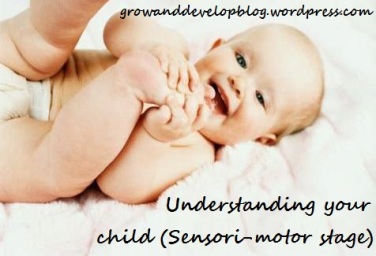I have recently been exploring Piaget’s theory of cognitive (brain) development. It has really opened my eyes to the world of the children that I look after (6 months to 2 years) and the way that they think. I’m hoping to do the same for you and your children, as well as provide some activities to do at each stage.

During the sensori-motor stage, the child is focused on her senses and movement, gradually gaining more control and focus. The child’s development is broken up into 6 ‘sub-stages’.
0-1 month – Reflexive schemes – Your newborn baby uses innate reflexes to explore her surroundings. She has automatic reactions to stimuli, for example grasping your finger or suckling. During this stage your baby will enjoy watching your face as you talk/sing/read to her, also focusing on contrasting images – try these art cards from Wee Gallery.
1-4 months – Primary circular reactions – Your baby is now very focused on her body (primary); she will often look intently at her hands and find her feet, sometimes mouthing those little toes. She will explore in a repetitive manner (circular) to increase her knowledge about herself. Great activities for this age group include baby massage, splashing in the bath tub, balloon kicking and tummy time using an exercise ball.

4-10 months – Secondary circular reactions – By now, your baby is very inquisitive and likes to explore the world around her, by reaching for objects in her environment and developing her controlled movements. Many activities can help your baby learn about the world, including sensory bags/bottles, edible finger painting, clapping songs, tug-a-toy play, touch and feel books like the ‘that’s not my…’ collection and playing peek-a-boo.

10-12 months – Co-ordination of secondary schemes – As your baby approaches her first birthday, she is learning to deliberately combine processes to achieve a goal, e.g. lifting a cloth to pick up a hidden toy. She is learning to manipulate the world around her. She will love playing with building blocks, stacking cups and treasure baskets. This egg drop game is perfect and water pouring is a great way to build hand-eye co-ordination.

12-18 months – Tertiary circular reactions – This is the stage where your child uses trial and error to explore different objects and their characteristics. Her little mind will be constantly on the go thinking ‘what if?’ ‘how does?’ and ‘can I?’ She is learning to develop the early stages of problem solving. This busy board is great for enquiring minds and she will spend ages finding out how everything works. She will also enjoy activities such as this contact paper craft, mud play; also playing with ICT toys with buttons, lights and music.

18-24 months – Beginning of thought – When your toddler is nearing her second birthday, she will begin to make mental representations and imitate seen behaviours. These role play and small world activities are great for developing this thinking – car wash, baby bath, 25 small world activities. Open-ended creative activities can help your child develop her own thinking – drawing, painting, play dough. She will begin to represent people and objects in her creations, saying “I paint mummy” and “it a dinosaur”. Also, story sacks are a great way to build her imagination whilst also developing social and communication skills.

What stage is your child at? Do they enjoy any of these activities? Is there something they love doing even more? I would love to hear from you xx


One thought on “Understanding your baby (Birth – 2 years)”